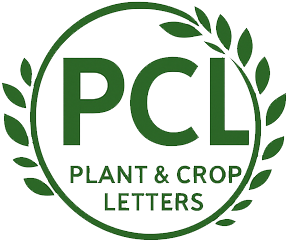Plant & Crop Letters adheres strictly to the Committee on Publication Ethics (COPE) Core Practices, the International Committee of Medical Journal Editors (ICMJE) recommendations, and the Open Access Scholarly Publishers Association (OASPA) code of conduct. All authors, editors, and reviewers are expected to uphold the highest standards of honesty, transparency, and research integrity. Any form of scientific or ethical misconduct is treated with zero tolerance.
Ethical Publishing & Misconduct Policy
Authors must ensure that all work submitted is original, accurate, and honestly presented. They are accountable for the integrity of the data and the validity of the conclusions.
Key author responsibilities include:
- Submitting work that has not been published elsewhere and is not under consideration by another journal.
- Providing full and accurate data, ensuring analyses are reproducible and transparent.
- Citing all sources properly and avoiding any form of plagiarism or self-plagiarism.
- Listing only those individuals as authors who made significant intellectual contributions, and acknowledging others appropriately.
- Disclosing conflicts of interest, funding sources, and ethical approvals in the manuscript.
- Ensuring that research involving humans, animals, or sensitive ecosystems follows recognized ethical standards and regulatory guidelines.
- Not manipulating figures, images, or data in ways that could mislead readers.
Authorship should be limited to individuals who have made substantial contributions in one or more of the following areas:
- Conception or design of the study.
- Acquisition, analysis, or interpretation of data.
- Drafting or critically revising the manuscript for intellectual content.
- Final approval of the version to be published.
- Agreement to be accountable for all aspects of the work.
Individuals who contributed but do not meet these criteria should be listed in the Acknowledgments section.
All participants in the publication process — authors, editors, and reviewers — must disclose any financial or personal relationships that might bias their judgment. Authors must include a “Conflict of Interest Statement” on the title page. Editors and reviewers must recuse themselves from handling manuscripts where conflicts exist.
Authors must maintain complete records of data and analyses.
If requested, they must provide datasets, images, or analytical code for editorial verification. Misrepresentation of data or selective omission of results constitutes research misconduct.
Plant & Crop Letters employs Turnitin/iThenticate to screen all submissions. The acceptable overall similarity index is below 19%, excluding references and standard phrases. Detected plagiarism, duplicate publication, or significant text recycling results in immediate rejection and may be reported to the author’s institution or funding body. In serious cases, formal retraction will be issued post-publication.
Image data must not be enhanced, obscured, moved, or altered beyond clarity adjustments applied uniformly. Authors must retain original images and be prepared to submit raw data upon request. Artificial or selective manipulation is considered misconduct.
Studies involving human participants, animals, or sensitive ecological systems must state compliance with institutional and national ethical guidelines.
For human studies, informed consent must be obtained; for animal work, adherence to recognized welfare protocols is mandatory. Relevant approval numbers or statements must appear in the Methods section.
Authors must not submit the same or substantially similar work to more than one journal, nor divide one dataset into multiple “least publishable units.”
Redundant or duplicate publications violate ethical standards and will be retracted if discovered.
Editors and reviewers must handle manuscripts confidentially and impartially.
They must:
- Evaluate work solely on scientific merit.
- Refrain from using unpublished material for personal advantage.
- Declare conflicts of interest immediately.
- Treat authors with fairness and professionalism.
If ethical concerns arise, the editorial office will follow COPE’s flowcharts for handling:
- Allegations of plagiarism.
- Data or image fabrication.
- Authorship disputes.
- Peer review manipulation.
- Undisclosed conflicts of interest.
The process includes:
- Preliminary assessment by the Editor-in-Chief.
- Formal investigation (may involve reviewers or institutions).
- Author notification and opportunity to respond.
- Editorial action — rejection, correction, or retraction depending on evidence.
Findings of confirmed misconduct are recorded permanently.
When major errors or misconduct are confirmed, Plant & Crop Letters will issue a:
- Correction (minor factual errors that do not affect conclusions).
- Retraction (major errors or unethical behavior invalidating conclusions).
- Expression of Concern (pending investigation outcomes).
All notices are linked to the original DOI and remain publicly accessible.
The journal encourages scholarly dialogue. Readers may submit letters to the editor or formal comments to correct or clarify published work. All comments are reviewed before publication to ensure factual accuracy and respectful tone.
Confirmed cases of misconduct may lead to:
- Article rejection or retraction.
- Temporary or permanent author bans.
- Notification to funding bodies, employers, or relevant institutions.
- Public disclosure if necessary to maintain the integrity of the scientific record.
Plant & Crop Letters values openness in every stage of publishing.
We ensure transparent peer review procedures, editorial independence, and public accessibility of all ethical policies.
All editors and reviewers must complete periodic training in publication ethics.
